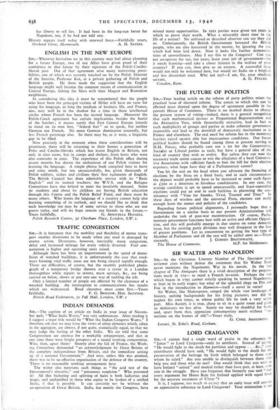THE FUTURE OF POLITICS
Sm,—Your leading article on the reform of party politics raises the practical issue of electoral reform. The extent to which this can be effected must depend tiPon the degree of agreement possible in the present House of Commons. There is no marked desire to change the present system of voting—indeed, there is a general recognition that such mathematical devices as Proportional Representation and the Alternative Vote, while theoretically attractive, lead in fact to such multiplicity of groups and parties as make coherent government impossible and lead to the downfall of democratic institutions as in France and elsewhere. The real need for reform lies in the monetary barriers raised against able but impecunious candidates. Our future political leaders should be found among those at present serving in H.M. Forces, who probably care not a jot for the Conservative, Socialist or Liberal .parties as such, but have a general idea of the kind of country they wish to evolve. But 'unless they can woo the necessary trade union caucus or win the allegiance of a local Conserva- tive Association with sufficient funds to foot the bill for their election expenses, what hope have they of a Parliamentary career?
You hit the nail on the head when you advocate the financing of elections by the State on a fixed basis, and in such circumstances the deposit would probably have to be increased to some such figure as L500 as a deterrent to frivolous candidatures. In any case, the average candidate is apt to spend unnecessarily, and State-controlled elections could put an end to such futilities as plastering the con- stituency with "Vote for Snooks, Tried, Trusted and True." In these days of wireless and the universal Press, electors can easily enough learn the names and policies of the candidates.
Regarding future political alignments, I personally hope that a Government on a similar basis to our present Administration will undertake the task of post-war reconstruction. Of course, Parlia- mentary government functions best with an active and efficient Opposi- tion, and this will probably emerge in due course on some domestic issue, but the existing party divisions may well disappear in the face of greater problems. Let us concentrate on getting the best type of Member of Parliament and all the rest will be added unto us.—Yours










































 Previous page
Previous page